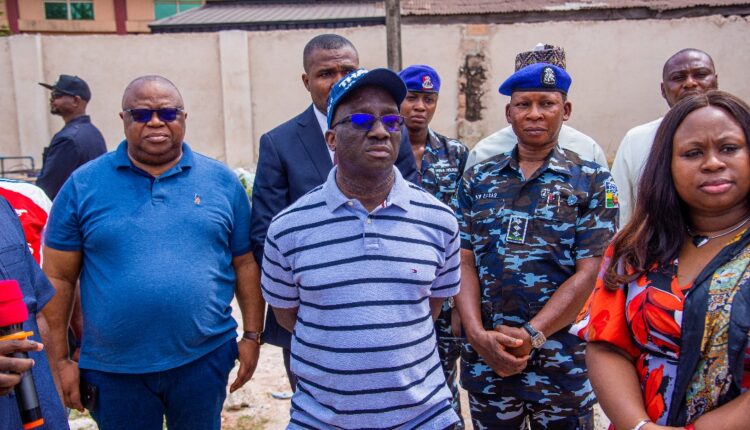Okpebholo’s Education Revolution: Edo Schools Undergo Historic Transformation
In what is shaping up to be one of the most ambitious education reform initiatives in recent years, Edo State Governor, Senator Monday Okpebholo, has launched an unprecedented statewide school renovation and reconstruction program.
With over 100 schools currently undergoing transformation and an additional 120 set for revamp, his administration is making an unmistakable statement: education is a top priority.
Chief Press Secretary to Edo State Governor, Fred Itua in a statement quoted him to have attributed the success of the efforts to President Bola Ahmed Tinubu’s Renewed Hope Agenda while inspecting projects across the state
He pointed out thst states are expected to align their policies with federal development goals.
“This isn’t just about renovating schools; it’s about restoring hope. Education is the foundation of any thriving society, and Edo’s children deserve world-class learning environments,” Okpebholo said during an inspection tour.
For years, schools in Edo State struggled with deteriorating infrastructure, overcrowded classrooms, and a lack of basic amenities. Many had been abandoned, leaving students to learn in poor conditions. Today, under Governor Okpebholo’s leadership, the tide is turning.
At Eweka Primary School, Obazagbon, pupils who once studied in dilapidated buildings now look forward to modern, well-equipped classrooms. At New Era College, Ikpoba-Okha, ongoing projects include new classroom blocks, staff offices, toilet facilities, perimeter fences, and boreholes to provide clean water.

Commissioner for Education, Paddy Emmanuel Iyamu, commended the governor’s approach, noting that his policies are not just about promises but action.
“Governor Okpebholo is a man of his word. The scale of work happening across the three senatorial districts proves that he is not just making statements—he is backing them up with results,” Iyamu said.
Beyond primary and secondary schools, the government is also strengthening technical education. Following a needs assessment, the state approved the recruitment of 100 technical school teachers, a move designed to equip students with practical skills and reduce reliance on external labor.
“The governor wants technical education in Edo to be among the best in Nigeria. That is why he has approved a specialized syllabus tailored to real-world needs,” Iyamu added.
As the renovations near completion, many are beginning to see Edo’s education revival as a potential model for other states. The State Universal Basic Education Board (SUBEB) Chairperson, Barr. (Mrs.) Onomen Briggs, hailed the administration’s achievements in just 100 days, noting that furniture for classrooms is already available, and some schools are more than 80% complete.
For parents, teachers, and students, these developments bring a renewed sense of optimism.
“We used to fear the rain because our classrooms would flood. Now, we have proper buildings, and learning is enjoyable again,” said a teacher at Oroma Primary School, Amagba.
Governor Okpebholo remains unwavering in his commitment to ensuring that no child in Edo is left behind. As the ‘New Edo’ emerges, the question remains: could this be the start of an educational revolution across Nigeria?

